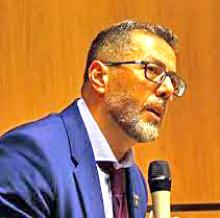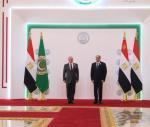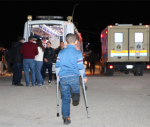You are here
Killing humanitarian workers as a strategy — Israel’s endgame in Gaza
Apr 09,2024 - Last updated at Apr 09,2024
Israel described its clearly deliberate killing of seven humanitarian aid workers on April 1 as a “grave mistake”, a “tragic event” that “happens in war”.
Israel is, obviously, lying. This entire so-called war, actually genocide, in Gaza, has been based on a series of lies, some of which Israel continues to peddle.
For some, in the mainstream media, it took months to accept the obvious fact that Israel has been lying about the events that led to the war and the military objectives of its constant targeting of hospitals, schools, shelters and other civilian facilities.
So, it was only logical for Israel to lie about killing the six internationals, and their Palestinian driver, of the World Central Kitchen (WCK). Notwithstanding an event as atrocious as this, it is implausible for Israel to start telling the truth now.
Luckily, few seem to believe Israel’s version regarding WCK, or its continued massacres elsewhere in Gaza. Israel “cannot credibly investigate its own failure in Gaza”, the US-based NGO said in a statement on April 5.
The issue of targeting these internationals, however, has to be placed within a larger context.
Israel was hardly secretive about its intentions to deny Palestinians even the most basic necessities of survival in Gaza, epitomized in the words of Israeli minister of defence Yoav Gallant on October 9: “There will be no electricity, no food, no fuel, everything is closed.”
Initially, this statement, and many others, were understood at the time to be an outcome of Israel’s desire to punish Palestinians for the October 7 Al Aqsa Flood operation, by resorting to its typical tactic of collective punishment.
With time, however, and based on statements made by other Israeli officials, it became clear that Israel wanted to ethnically cleanse Palestinians altogether.
The Israeli stratagem was immediately rejected by Egypt, Jordan, Arab countries and, eventually, by other governments around the world.
Israel, however, persisted. Israeli finance minister Bezalel Smotrich said that the “voluntary migration” of Palestinians in Gaza is the “right humanitarian solution”. Netanyahu concurred. “Our problem is [finding] countries that are willing to absorb Gazans, and we are working on it,” he said.
But for ethnic cleansing to take place, several prerequisites had to be fulfilled:
One, the bulk of Gaza’s 2.3 million people had to be forced to the south, as close to the Egyptian border as possible. This has been achieved.
Two, all aspects of life had to be destroyed throughout Gaza, including all hospitals and clinics.
The most obvious examples were the grisly massacre of the Al Ahli Baptist Hospital on October 17, and the bloodbath and eventual total destruction of Gaza’s largest medical complex, Al Shifa, on April 1.
When the Israeli military pulled out of the Shifa area, they left behind one of the most tragic scenes in the history of modern warfare. Hundreds of bodies were hurriedly buried in mass graves amid charred buildings and indescribable ruins. Limbs of children were sticking out of the dirt, whole families tied and executed together and other crimes that would take the world a long time to fathom, let alone explain.
Still, and nonchalantly so, former Israeli prime minister Naftali Bennet said that “not one civilian” was killed in Al Shifa. Again, Israel is lying.
Three, most shelters, bakeries, markets, electric grids and water generators had to, from an Israeli perspective, also be targeted so that the hapless population, especially of northern Gaza, would realise that life there is simply unsustainable.
Becoming fully aware of Israel’s ultimate plan of inducing a famine in Gaza, Palestinians fought back. The counter Palestinian strategy was predicated on ensuring that as many Palestinians as possible remained in northern Gaza, and that those concentrated in Rafah were not pushed into the Sinai desert.
Aside from the ongoing battle between the Israeli army and Palestinian Resistance in Gaza, there was another type of war taking place: Israel’s push for the ethnic cleansing of Palestinians and the latter’s desire to survive and remain within the Gaza borders.
This is precisely why Israel killed countless Palestinians involved in the work of facilitating life in northern and central Gaza.
According to the United Nations, prior to the killing of the six internationals, Israel had already killed 196 humanitarian aid workers.
This number does not include doctors, medical staff, civil defense workers, police chiefs and officers, and anyone contributing to sustaining life in areas that Israel wanted empty of its inhabitants.
Even when, under international pressure, Israel had allowed limited aid to enter northern Gaza, the Israeli military repeatedly killed and wounded Palestinians who desperately gathered in the hope of receiving the life-saving supplies.
According to an April 4 report by Euro-Med Human Rights Monitor, Israel has killed 563 Palestinians and injured 1,523 when it bombed people waiting for aid at designated spots in northern Gaza, or when it bombed distribution centres and workers responsible for distributing the aid.
The Kuwait roundabout area, in Gaza City alone, witnessed the murder of 256 starving refugees, while 230 others were killed on Al Rashid Street, elsewhere in the city.
Israeli bombing was not random, as Israel also targeted and killed 41 police officers who had worked with volunteers from various Gaza clans to help the UN refugee agency, UNRWA, distribute the aid among the famine-stricken population. Even the clans themselves were targeted in equally merciless bombardments.
And similar to the outcome of the attack on the WCK workers, each time the entity responsible for the aid would declare that they would no longer be involved in aid distribution. This is how Gaza’s hunger turned into outright famine.
The latest killing of the internationals in Gaza was done to serve the same goal: ensuring that no aid distribution mechanism is allowed.
Ironically, the involvement of the WCK was itself an outcome of a US negotiated agreement that would deny the Gaza authorities and even UNRWA any role in receiving and distributing aid.
Israel must be stopped at any cost, and Israeli war criminals must be held accountable for one of the greatest genocides in modern history.
Ramzy Baroud is a journalist, author and the Editor of The Palestine Chronicle. He is the author of six books. His latest book, co-edited with Ilan Pappé, is “Our Vision for Liberation: Engaged Palestinian Leaders and Intellectuals Speak Out”. His other books include “My Father was a Freedom Fighter” and “The Last Earth”. Baroud is a non-resident senior research fellow at the Centre for Islam and Global Affairs (CIGA). His website is www.ramzybaroud.net














Add new comment